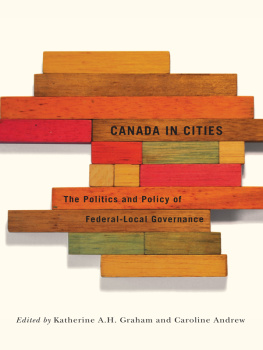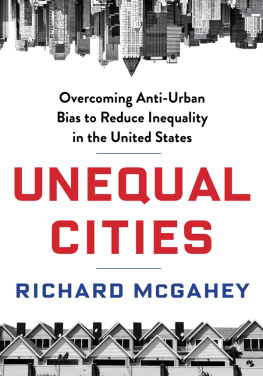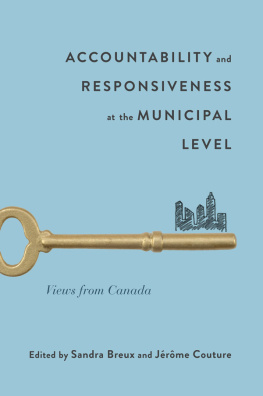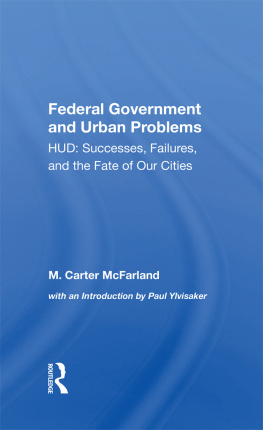
CANADA IN CITIES
FIELDS OF GOVERNANCE: POLICY MAKING IN CANADIAN MUNICIPALITIES
Series editor: Robert Young
Policy making in the modern world has become a complex matter. Much policy is formed through negotiations between governments at several different levels, because each has particular resources that can be brought to bear on problems. At the same time, non-governmental organizations make demands about policy and can help in policy formation and implementation. In this context, works in this series explore how policy is made within municipalities through processes of intergovernmental relations and with the involvement of social forces of all kinds.
The Fields of Governance series arises from a large research project, funded mainly by the Social Sciences and Humanities Research Council of Canada, entitled Multilevel Governance and Public Policy in Canadian Municipalities. This project has involved more than eighty scholars and a large number of student assistants. At its core are studies of several policy fields, each of which was examined in a variety of municipalities. Our objectives are not only to account for the nature of the policies but also to assess their quality and to suggest improvements in policy and in the policy-making process.
The Fields of Governance series is designed for scholars, practitioners, and interested readers from many backgrounds and places.
1 Immigrant Settlement Policy in Canadian Municipalities
Edited by Erin Tolley and Robert Young
2 Urban Aboriginal Policy Making in Canadian Municipalities
Edited by Evelyn J. Peters
3 Sites of Governance Multilevel Governance and Policy Making in Canadas Big Cities
Edited by Martin Horak and Robert Young
4 Image-building in Canadian Municipalities
Edited by Jean Harvey and Robert Young
5 Federal Property Policy in Canadian Municipalities
Edited by Michael C. Ircha and Robert Young
6 Multilevel Governance and
Emergency Management in Canadian Municipalities Edited by Daniel Henstra
7 Canada in Cities The Politics and Policy of Federal-Local Governance
Edited by Katherine A.H. Graham and Caroline Andrew
Canada in Cities
The Politics and Policy of Federal-Local Governance
Edited by
KATHERINE A.H. GRAHAM AND CAROLINE ANDREW
McGill-Queens University Press
Montreal & Kingston London Ithaca
McGill-Queens University Press 2014
ISBN 978-0-7735-4403-1 (cloth)
ISBN 978-0-7735-4404-8 (paper)
ISBN 978-0-7735-9629-0 (ePDF)
ISBN 978-0-7735-9630-6 (ePUB)
Legal deposit fourth quarter 2014
Bibliothque nationale du Qubec
Printed in Canada on acid-free paper that is 100% ancient forest free (100% post-consumer recycled), processed chlorine free
McGill-Queens University Press acknowledges the support of the Canada Council for the Arts for our publishing program. We also acknowledge the financial support of the Government of Canada through the Canada Book Fund for our publishing activities.
Library and Archives Canada Cataloguing in Publication
Canada in cities : the politics and policy of federal-local governance / edited by Katherine A.H. Graham and Caroline Andrew.
(Fields of governance : policy making in Canadian municipalities ; 7) Includes bibliographical references and index.
Issued in print and electronic formats.
ISBN 978-0-7735-4403-1 (bound). ISBN 978-0-7735-4404-8 (pbk.). ISBN 978-0-7735-9629-0 (ePDF). ISBN 978-0-7735-9630-6 (ePUB)
1. Federal-city relations Canada Case studies. 2. Urban policy Canada Case studies. 3. Municipal government Canada Case studies. 4. Cities and towns Canada Case studies. I. Andrew, Caroline, 1942, author, editor II. Graham, Katherine A., 1947, author, editor III. Series: Fields of governance ; 7
JS1711.C26 2014 | 307.760971 | C2014-904351-1 |
Typeset by Jay Tee Graphics in 10.5/13 Sabon
Tables and Figures
TABLES
FIGURES
Foreword
This collection is a major contribution to the study of both municipal and federal government in Canada. More centrally, it advances our understanding of federal-municipal interaction and of how this relationship shapes policies that are important to all Canadians. The chapters presented here depict the changing role of the federal government and show the importance of leadership and political considerations in policy making.
Two types of policy field are examined here. First are traditional areas under the domain of federal departments infrastructure, immigrant settlement, emergency management, and urban Aboriginal policy. Second are newer, horizontal policy areas where federal interventions target particularly complex and difficult problems such as homelessness, child care, and community economic development. Together, these thorough case studies greatly expand our knowledge of federal initiatives and how they affect municipalities.
The analyses in this volume are concerned with three main aspects of policy. The first is demographic change. Many important policies devised by Ottawa are responses to the changing composition of the citizenry and to anticipated trends. The second policy dimension is how issues are framed by different governments and leaders. Finally, once the problems have been defined, is the choice of policy instruments that are deployed to solve them. While these concerns inform the studies gathered here, one of the strengths of this work is its historical coverage. Every chapter traces the context and evolution of the policy in considerable detail. This is one reason why the research should be of interest not only to scholars, students, and policy makers but also, we hope, to citizens. Part of our goal is that suggestions for improving policy and the policy-making process will benefit citizens.
This collection presents original research that stands alone, making a big advance in the study of federal-local governance. But it is also part of a larger project, Multilevel Governance and Public Policy in Canadian Municipalities. This project has several components studies of how major cities fit the structure of other federations, in-depth explorations of several policy fields, and work that concentrates on Canadas major cities. The overall objectives of the project are to document the policies that exist in many places and to analyze the processes of intergovernmental relations and the pressures of social forces that have produced them. We also aim to draw conclusions about how better policies could be made. More information about the project is available at www.ppm-ppm.ca.
Some acknowledgements are appropriate here. The first debt is to the authors. It is almost a decade since the idea for this volume was conceived. Not surprisingly then, it is the product of a great deal of effort and patience by many. We would like to thank our authors and co-authors for their contributions to the volume. Aside from your diligence as scholars, you were patient with the sometimes slow pace of our work and responsive when we needed quick action. Your commitment and support for this project has been remarkable. Nothing would have been accomplished, however, without the support of the Social Sciences and Humanities Research Council of Canada through its Major Collaborative Research Initiatives Program. Katherine Graham and Caroline Andrew were both instrumental in advancing this project, along with Andrew Sancton and Harvey Lazar. We especially thank SSHRCs Jean-Franois Fortin, who worked with the project and supported it over several years. The University of Western Ontario contributed generously to the project, and Carleton University and the University of Ottawa also helped. We thank McGill-Queens University Press for its commitment to and for supporting this project. Special thanks go to Jacqueline Mason, who shepherded the work through the editorial approval process. Ms Kelly McCarthy has served as project manager for the whole research project. And thanks are due to Amy Cunningham of Carleton University, who facilitated the editor-author-publisher shuffle in the preparation of this volume.
Next page








